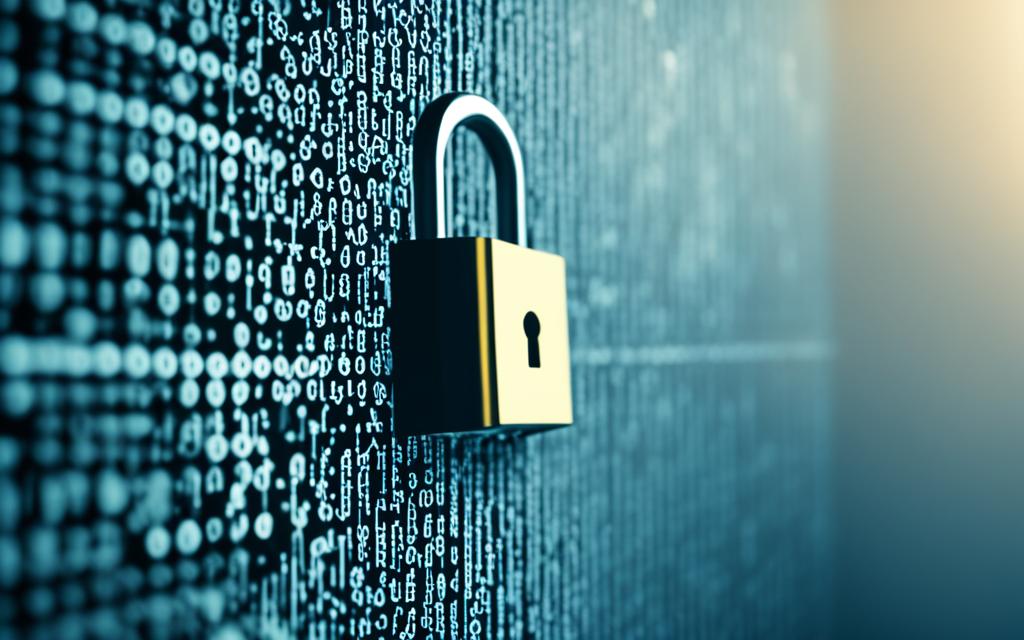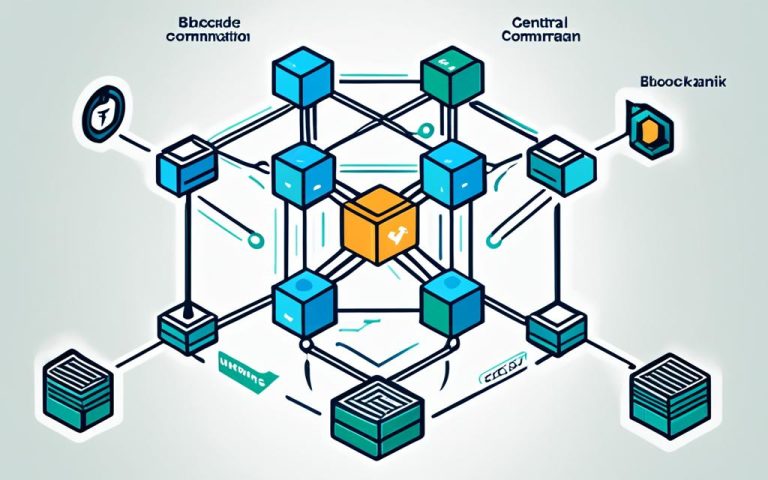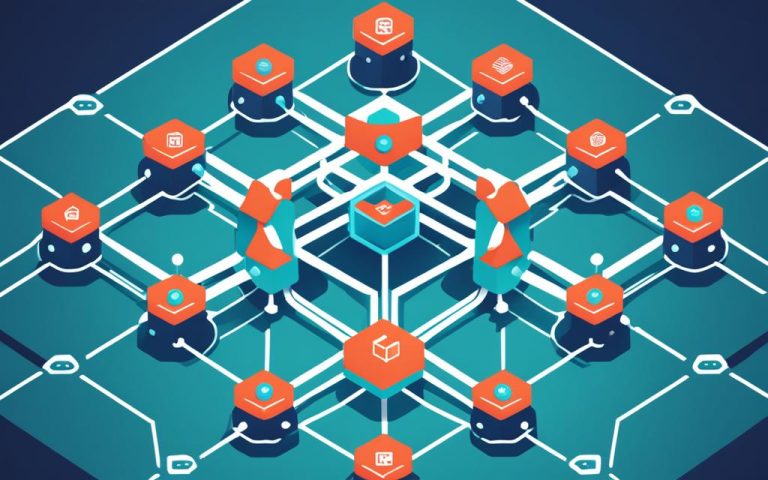Blockchain technology is changing how we protect data privacy. It introduces secure, clear, and spread out solutions. This makes it easier to follow rules like the GDPR and CCPA.
This technology uses things like distributed ledger technology to improve privacy. It’s being used in fintech, real estate, healthcare, and retail. These sectors use blockchain to keep data safe and meet privacy laws.
One big benefit of blockchain is how it safely stores data. It spreads data across several nodes, reducing risk. Since data isn’t in one place, it’s tougher for hackers to attack.
Blockchain’s openness lets people see how their data is used. Everyone can see transactions, which builds trust. Knowing what happens with our data gives us more control.
Blockchain lets us share only certain data, keeping our privacy. It uses special methods to do this. This is especially good in healthcare, protecting patient information.
Using blockchain means thinking about privacy laws like GDPR and CCPA. These laws make sure we protect personal data well. Blockchain helps meet these rules by being secure and clear.
In the end, blockchain has a lot of promise for privacy. Its key features help keep data safe. As worries over data privacy grow, blockchain is a smart way to respond.
Blockchain Technology Characteristics
Blockchain technology offers many benefits based on distributed ledger technology. It improves data privacy and security. It includes:
- Distributed Ledger Technology: It uses a system where data can be accessed and changed by many users. This stops any one person from having total control, making data more secure.
- Consensus Mechanisms: Methods like proof-of-work and proof-of-stake help confirm transactions. They require everyone to agree, stopping unauthorized changes.
- Transaction Immutability: New blocks are securely connected to previous ones. Once data is recorded, it can’t be deleted or changed easily. This keeps transactions safe and secure.
This technology is perfect for keeping data safe and private. With distributed ledger, consensus methods, and secure transactions, blockchain protects data. It’s used in many industries.
For more information on blockchain’s role in data privacy and security, check out these resources:
- Data Mania: How Does Blockchain Support Data Privacy and Storage Security
- Swiss Money: How Does Blockchain Support Data Privacy
- CoinSwitch: What Is Immutable Ledger in Blockchain and What Are Its Benefits
Companies Utilizing Blockchain Technology
| Company | Industry |
|---|---|
| IBM | Technology |
| Microsoft | Technology |
| Oracle | Technology |
| Intel | Technology |
| Goldman Sachs | Finance |
These companies are using blockchain to keep data private and secure. Their use of blockchain shows its importance and potential.
Recent Trends in Data Privacy Law
Nowadays, data privacy laws are more crucial than ever. The GDPR and CCPA are at the forefront. Organizations around the world are feeling the impact, especially with blockchain technology.
The GDPR is a major EU privacy rule. It sets high standards for handling personal data of EU citizens. It’s all about making sure data processing is legal, people know their rights, and data is secure.
On the other side, California’s CCPA protects its residents’ data privacy. It lets people find out what personal info is collected on them. They can also ask for their data to be deleted. This law is sparking more privacy rights talk in the U.S.
Both GDPR and CCPA are making organizations think more about privacy. Whether it’s for blockchain or general data handling, they stress the role of companies and governments in protecting our data.
Impact on Blockchain Technology
Blockchain tech feels the effects of GDPR and CCPA too. Its design protects privacy through decentralization and secure records. But, organizations must ensure this tech complies with privacy laws.
“The GDPR and CCPA encourage privacy-focused practices in blockchain,” states Sarah Johnson, a privacy expert. “They boost the creation of technologies that let people manage their own data.”
To follow privacy laws, blockchain applications need to think about user anonymity and consent. Privacy mechanisms like data access and correction are also important.
Striking the Balance
While privacy laws are important, they must balance with blockchain’s benefits. Blockchain offers secure data sharing and greater trust. It’s great for various sectors.
“Finding a balance between blockchain benefits and privacy law compliance is key,” says Mark Davis, a blockchain consultant. Careful planning and privacy-first methods are essential.
Companies that focus on privacy can win customer trust. This leads to a better position in the market. And, it helps shape the future of data privacy.
Summary
The GDPR and CCPA are key players in the data privacy world. Companies must understand these laws to use blockchain effectively. By focusing on privacy and following specific principles, companies can enjoy blockchain’s perks without compromising on privacy.
| GDPR | CCPA |
|---|---|
| Implemented by the EU | Implemented by California |
| Sets high standards for data protection | Gives residents the right to know what personal data is being collected and request its deletion |
| Applies extraterritorially to protect EU residents’ data | Has inspired other states to introduce similar legislation |
| Requires organizations to ensure the legality of personal data processing, inform individuals about their rights, and maintain data security |
Conclusion
Blockchain technology has many benefits for data privacy. It stores data across a network, not just one place. This makes data hard to tamper with. Using secret codes, blockchain keeps data safe and clear to those who need to see it.
However, there are hurdles to overcome with blockchain. Transactions can be seen by all, which might risk personal info. Also, making different blockchain systems work together is tough. Keeping data safe and private is an area that needs constant work.
Yet, blockchain is a strong ally for data privacy. It offers new ways to keep personal data safe in the digital world. With its potential to improve privacy and security across sectors, it helps both people and businesses.
FAQ
How does blockchain technology support data privacy?
Blockchain technology helps keep data safe and private by being clear and not centered in one place. It uses a special system that records transactions in a way no one can change or delete. This system gives people more power over their personal data.
What are the characteristics of blockchain technology?
Blockchain is based on shared ledger technology, making data accessible and exact across different users. Methods like proof-of-work and proof-of-stake confirm transactions are real and keep data safe. It protects data from being altered, thanks to a secure coding method.
What are the recent trends in data privacy law?
The GDPR and CCPA are recent important data protection laws. The GDPR protects the data of people living in the EU. It sets high data safety requirements. Meanwhile, the CCPA lets people in California control their own data. Both highlight the increasing focus on keeping personal data safe.
What are the advantages and challenges of blockchain technology for data privacy?
Blockchain offers benefits like keeping data spread out, making it everlasting, and giving users more control over their info. It uses advanced coding to protect data while keeping actions clear and responsible. However, public transaction records and the chance of personal data leaks pose challenges. Research is focusing on making the technology better and safer.



















